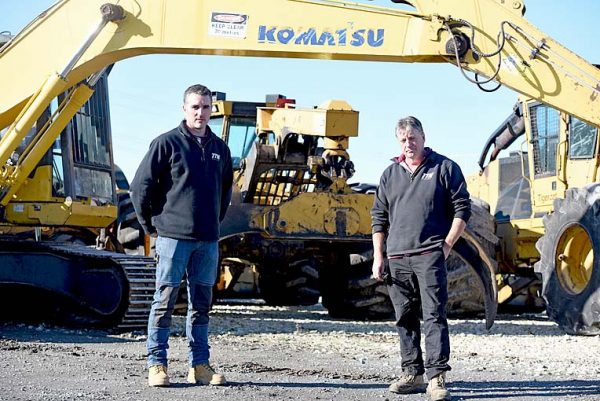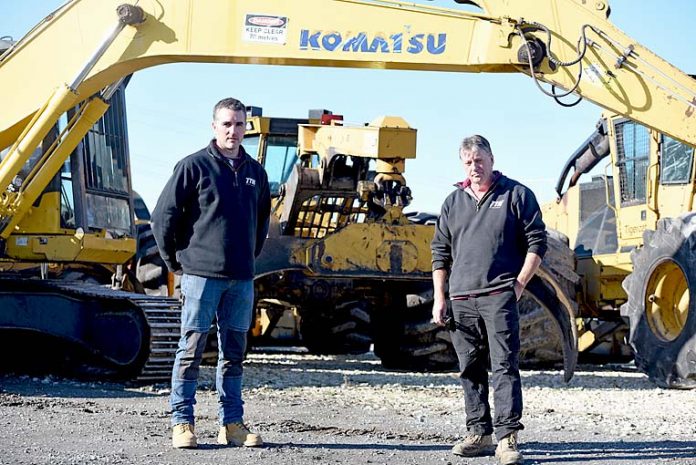
SPECIAL REPORT
THE region’s forestry industry is calling for greater domestic processing amid a dramatic slump in hardwood harvesting operations.
While the softwood industry remains stable, the lack of bluegum woodchip vessels arriving at the Port of Portland has brought the multi-million dollar hardwood harvesting sector to a standstill.
It is understood nearly 150 workers within the harvesting and haulage sector have been stood down because of the growing crisis fuelled by COVID-19.
More than $70m worth of harvesting and haulage machinery is now sitting idle in depots across the Limestone Coast as the industry grapples with an uncertain future.
Tabeel Trading managing director Steve Witherow said dozens of the company’s harvesting and haulage machinery was parked at its Mount Gambier depot.
“We have about $22m worth of machinery sitting in the depot,” Mr Witherow told The Border Watch yesterday.
This fleet of machinery includes harvesters, forwarders, chippers, trailers, trucks and utilities.
“It is a terrible sight to see all the machinery sitting there. It has been just a dead stop,” Mr Witherow said.
“They are definitely telling us there will be no restart to the end of July, but that is an unknown.”
The company chief said 43 workers were now on JobKeeper with more expected to be stood down next month.
“There is still more equipment to come off from hardwood and that will finish off next week,” Mr Witherow said.
“The whole hardwood industry has just stopped, there was no warning. We are now in the hands of bankers and JobKeeper.”
Mr Witherow said his heart went out to the employees affected by the stand down.
“ It shows how reliant the hardwood sector is on exports,” he said.
Mount Gambier industry leader Wendy Fennell – who is the managing director of Fennell Forestry – said the hardwood sector was now at the crossroads given the collapse of the woodchip export market.
She said the current crisis elevated the need to push for greater domestic processing, including the bluegum resource.
“ Even though these struggling times, this i s the time to change the way we do things,” Ms Fennell said.
Ms Fennell – who raised the crisis with Minister Tim Whetstone – also echoed concerns over the lack of certainty over resource contracts.
“ They are five year contracts, but there is no certainty – there is $7m of equipment parked in my yard and that usually runs 24 hours per day,” she said.
“ There is no volume security in the contracts. We have been turned off for two months now and we are not generating a stick from that investment.”
Ms Fennell – who is the chair of the Forestry Industry Advisory Council SA – said the industry had no clear date when the hardwood industry could rebound.
“They are talking ships could resume July 15, but that is no certainty,” she said.
While the hardwood harvesting machinery were being mothballed in the yard, she said softwood was “ticking along”.
“Softwood has been more consistent, whereas hardwood has been very erratic. There have been highs and lows because of the global market,” the harvesting operator said.
“It is a difficult to come up with a contract model to ride those market fluctuations.”
Ms Fennell also warned the softwood industry was nervously watching whether the economic downturn would hit the sector.
“We are all gripping on at the moment, but we are running out of time.”
Ms Fennell said the softwood sector needed new building starts to remain buoyant.
“There are some concerns that demand for that may drop off if there is no stimulus for new building. We need that push to ensure that wood is used domestically,” she explained.
“We need to be thriving on our domestic market.”
She revealed there was growing frustration given forestry was a significant industry with a positive outlook.
“To see this part of the supply chain fall over in this time is disappointing given it is so needed in the future,” she said.
The industry identity warned if a number of harvesting and haulage businesses collapsed this would trigger a huge deficit in the supply chain.
It is understood the majority of workers stood down are from South Australian-based companies.








